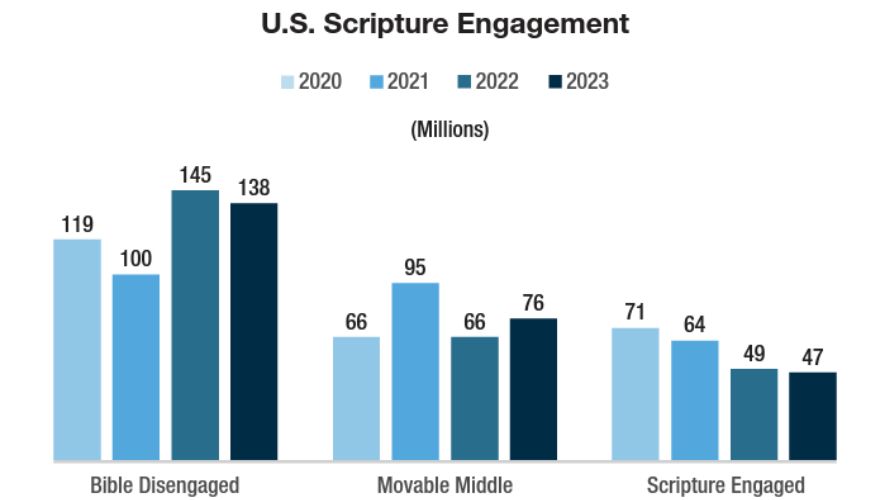
PHILADELPHIA (BP) – Scripture engagement remains down among Americans, but a widespread curiosity gives ground for evangelism, the American Bible Society (ABS) said in releasing the first chapter of its 2023 State of the Bible survey.
Only 47 million Americans, or about 18 percent of the adult population, ranked as Scripture-Engaged in the 2023 study, using a descriptor based on Bible use and its impact in one’s life. Scripture-engaged described 49 million adults in 2022, down from 71 million adults in 2020 or about 27 percent of the adult population.
While Scripture engagement remains low, adults ranked in a category termed the Movable Middle grew by 10 million from 2022 to 2023, the study found, rising to 76 million. The movable middle spiked to 95 million in the 2021 COVID-19 pandemic year, but dropped back to pre-pandemic levels in 2022, reverting to 66 million.
The ABS finds hope in the newest numbers.
“The Movable Middle is awash in curiosity, with more than two thirds (68 percent) “very” or “extremely” curious and only a smidgen (3 percent) not curious at all,” the ABS wrote. “Granted, there’s a difference between wondering and actively searching, but this is a start. Curiosity is a growth platform for Bible ministry in the U.S. How will we respond?”
While 138 million adults are ranked as Bible Disengaged – those who score lowest on the Bible engagement scale – the number is lower than the 145 million who were characterized as disengaged in 2022. And those who are disengaged see Scripture as increasingly central to their lives and impactful in their behavior.
“That leads us to say that, not only are there 10 million fewer Bible Disengaged Americans than there were last year, they aren’t as disengaged as they used to be,” the ABS said. “If the trend continues, we might see even more migration into the Movable Middle in 2024.”
Participants in the study registered frustrations in Bible reading. Including all three categories of scripture engagement, 26 percent said they don’t have enough time to read the Bible; 17 percent don’t know where to start, 16 percent are not excited to read Scripture, 15 percent have difficulty relating to the language, 9 percent find the layout difficult to navigate, and 8 percent find the stories confusing.
But those who do read the Bible cite positive motivations including wanting to be closer to God (47 percent), gaining wisdom for making life decision (20 percent), for comfort (15 percent), learning God’s nature (9 percent), learning how to treat others (4 percent), a sense of duty (3 percent) and to fulfill class or Bible study requirements (2 percent).
The ABS encourages churches to engage members in Scripture by asking communities about their practices, motivations and frustrations regarding the Bible, sincerely listening to their answers and finding ways to help; making a positive case for the benefits of Scripture engagement in youth, showing people how to start reading Scripture, and creating or curating mood-based resources to engage those who rank as Bible-disengaged.
The ABS released its first chapter of the 2023 study April 6 and plans to release subsequent chapters monthly, focusing on Changing Faith and The Faith of Our Mothers, Flourishing and the Bible, Spiritual Vitality in America, The Faith of Generation Z, The Bible and Behavior in America, Technology and the Bible and Giving it All: Philanthropy and Service.
Now in its 13th year, the State of the Bible annually looks at the Bible, faith and the church in America. The ABS collaborated with the University of Chicago’s National Opinion Research Center (NORC) in designing the study conducted online and via telephone to NORC’s AmeriSpeak Panel. The 18-minute survey, conducted Jan. 5-30, produced 2,761 responses from a representative sample of adults 18 and older within the 50 states and D.C.
The first chapter is available here.
(EDITOR’S NOTE – Diana Chandler is Baptist Press’ senior writer.)


